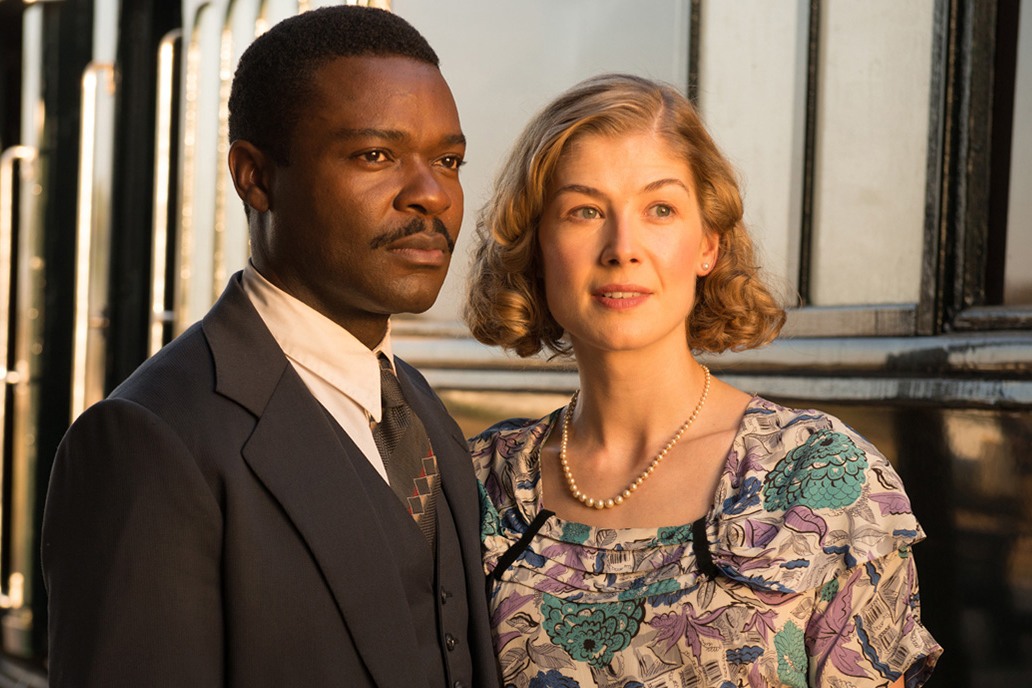As variations on “We can’t see each other anymore” go, this film’s plot has novelty: After enjoying a wonderful first date in postwar London, the young woman makes it clear to the young man that she would like to see him again. He hesitates, clearly preparing to tell her the truth about something. The sad thing is, he explains, his grandfather was a royal personage and his parents died young, so he really must return to his native country and be—you know—the king. This is not the beginning of an Ernst Lubitsch comedy from the 1930s, but a slice of history based on the story of Seretse Khama (David Oyelowo, from Selma), the royal heir of Bechuanaland—now called Botswana—and Ruth Williams (Rosamund Pike), the Englishwoman he married.
In A United Kingdom, the marriage of a black African man and a white British woman is an important part of the plot, and for the first half-hour or so it appears this is what the film will be about. It’s 1947: Her family is troubled by this marriage, and so is his. Khama’s decision to bring home a white queen gives his uncle (the calmly forceful Vusi Kunene) a chance to keep his hold on power. The interracial romance actually turns out to be a door into a more complex geopolitical chess match, in which the dying specter of colonialism makes its final grabs at maintaining dominance in Africa.
It might be useful to measure the difference between this film and Loving, the Oscar-nominated story about an American interracial marriage of the same period. By design, Loving keeps its gaze micro-focused on the people at the heart of what became an important legal case; it spares very little time for the court battle that overturned miscegenation laws or the larger battle for civil rights in the U.S. A United Kingdom, on the other hand, really begins to catch fire when it shows the big picture—“We are pawns in a larger game,” as Khama says. The royal marriage crisis opens issues of how Great Britain maintains its exploitative hold on Bechuanaland, and how the politics of the African country are being fueled by British fears of losing its profitable connection to South Africa, Bechuanaland’s neighbor. South Africa isn’t keen on having a nearby king legally married to a white woman—it could really prove a distraction from, say, building an entire society on apartheid.
Screenwriter Guy Hibbert (Eye in the Sky) and director Amma Asante lay out the dominoes in the story so that the political power plays—including Winston Churchill’s betrayal of a campaign promise to help Khama’s case—unfold in comprehensible chapters. The real events took longer than the film suggests, and surely the ins and outs were more complex, but the movie doesn’t feel dumbed-down. Two composite characters, ably embodied by Jack Davenport and Tom Felton, provide the villainy as English bureaucrats who wear their assumed superiority with blissful pride. Davenport gets one of Hibbert’s best-coiled lines, when his government official loftily assures Khama that when it comes to Bechuanaland’s ability to determine its own policies, “Your people will have some say in our running of your affairs.”
Asante previously directed Belle, and both films tend toward a BBC-pleasant visual style that doesn’t especially distinguish itself. And while Oyelowo and Pike (late of Gone Girl) are expert actors, they don’t establish much of the crucial chemistry that is supposed to fuel their defiant love story—the movie needs us to take that on faith so we can move on to the meatier stuff. But there is something clever about creating a film that appears to be an against-all-odds romance—complete with soaring music, pretty sunsets, and a cornball final freeze frame of the adoring lovers—and smuggling in a seminar on African politics instead. Sometimes a movie can have a bland face but a fierce heart. A United Kingdom, Rated PG-13. Opens Fri., Feb. 24 at Guild 45th.
film@seattleweekly.com






